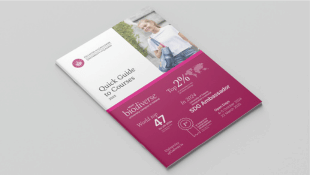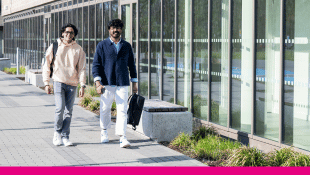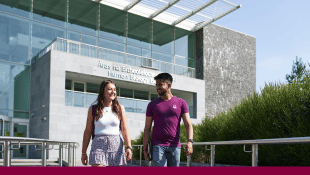-
Courses

Courses
Choosing a course is one of the most important decisions you'll ever make! View our courses and see what our students and lecturers have to say about the courses you are interested in at the links below.
-
University Life

University Life
Each year more than 4,000 choose University of Galway as their University of choice. Find out what life at University of Galway is all about here.
-
About University of Galway

About University of Galway
Since 1845, University of Galway has been sharing the highest quality teaching and research with Ireland and the world. Find out what makes our University so special – from our distinguished history to the latest news and campus developments.
-
Colleges & Schools

Colleges & Schools
University of Galway has earned international recognition as a research-led university with a commitment to top quality teaching across a range of key areas of expertise.
-
Research & Innovation

Research & Innovation
University of Galway’s vibrant research community take on some of the most pressing challenges of our times.
-
Business & Industry

Guiding Breakthrough Research at University of Galway
We explore and facilitate commercial opportunities for the research community at University of Galway, as well as facilitating industry partnership.
-
Alumni & Friends

Alumni & Friends
There are 128,000 University of Galway alumni worldwide. Stay connected to your alumni community! Join our social networks and update your details online.
-
Community Engagement

Community Engagement
At University of Galway, we believe that the best learning takes place when you apply what you learn in a real world context. That's why many of our courses include work placements or community projects.
Practical Matters
Application Forms
Applying to your host university
All host universities abroad will have application forms that must be completed by incoming Erasmus+ students. You should ensure that you complete such forms by the due date. Often, they will be sent to you by the host university once they have received your name and address from your academic coordinator here in Galway. Otherwise your coordinator will be able to direct you to the form. Most forms are now completed online, though some universities may require you to post them a printed copy, signed by your coordinator.
Registering at the host university
This might be done in person upon arrival, although nowadays the process might also be done online. You may be asked to provide:
- a copy of your birth certificate (this may need to be a translated version; your academic department can help you with this);
- passport photographs, or a suitable photo that you can upload via your phone to the university's applications/admissions portal;
- your passport, or a copy of same;
- a letter saying your home university has nominated you as an Erasmus+ student and that you are in receipt of an Erasmus+ Mobility Grant. (You will get this from Global Galway);
- a confirmation of your acceptance at the university, if applicable;
- your European Health Insurance Card.
- Take note that some universities will also require you to provide evidence of your private travel insurance.
-
Documents that you'll need to send to University of Galway
Please go to our Latest News pages for full details of all the documents that you will have to submit to University of Galway before, during and after your Erasmus+ mobility period.
Accommodation
Each outgoing Erasmus+ student is responsible for organising his/her accommodation abroad. University of Galway cannot provide this service. However, each host university will have an Accommodation Office with detailed knowledge of the local area and the available options; that office will therefore be well placed to offer appropriate advice and support to incoming international students.
You should be aware that it won’t always be possible to book a room in a student residence, as there is a limited supply of such accommodation and it can fill up quickly. If this type of accommodation is available, it’s advisable to take advantage of it. You will normally need to complete a booking form in advance, often at the time of making your application to the host university. In a lot of cases, student accommodation is allocated on a “first come, first served” basis. It is imperative that you do not delay in returning booking forms. Mention what subjects you are studying when you complete the accommodation booking form: it may be possible to allocate you student accommodation near to the faculties of the subjects you will be studying. University of Galway students who previously attended your host university may also be able to recommend a particular student residence. You may be requested to pay a deposit in advance - pay this on time to avoid disappointment. Your rental contract will most likely oblige you to pay in full for each month, even if you might not be there for all of the final month. Be aware that in many cases, student residences are managed by agencies external to the university, so that the university itself may have little control over the allocation of rooms.
It is worth noting that some student accommodation abroad may not be of a very high standard and may be located a distance from the university. You may find that cooking utensils are not provided and that a number of people could be sharing communal cooking and bathroom areas. If you are not comfortable with this, you may be better advised to seek accommodation in the private sector. Research your options thoroughly and speak to returned Erasmus+ students before you make a final decision.
If you wish to rent accommodation on the private market, you should only do so after having viewed the premises in person: never pre-book over the internet, especially where a deposit is requested, unless you know that the person with whom you are dealing is bona fide. Accommodation scams are becoming increasingly common, and you stand to lose a substantial amount of money in this way.
Where student accommodation is either not available or not your preferred option, it is strongly advised that you make appropriate arrangements in advance. This may mean booking into a hotel or hostel and arriving a week or two before the teaching term starts in order to give yourself time to search for private accommodation. Visit the university’s Accommodation Office, as the staff there will be able to assist you and give you advice. Try to find out about different neighbourhoods in terms of their safety and their proximity to the university, and get an idea of the going rates for monthly rent. You are also advised to be careful signing contracts – read the small print. And remember that it is not advisable to accept accommodation if you have any reservations about the security and safety of the property.
While it may seem convenient and reassuring to share accommodation with other English-speaking students, former Erasmus students have often commented that this was not always advantageous from the points of view of language learning and integration into the new environment, and you should consider all of this when you are looking for somewhere to stay.
Once you have secured your accommodation, make a note of and report anything damaged or missing. If, during your stay, you cause damage to the property, the cost of repairs will be deducted from your deposit. If you encounter issues such as mould or mildew, be sure to notify the landlord/agency/manager so that this is dealt with promptly.
Students renting accommodation in France should qualify for financial assistance from the CAF (Caisse d’Allocations Familiales), and you can apply for this online. Your host university will be able to advise.
Students who live at home while attending university in Galway may find the search for accommodation the most daunting aspect of the stay abroad. However, with careful and early planning most students don’t have any major problems.

Consider carefully the following points:
- What types of accommodation options are available and what is the cost of each option?
- What forms are needed to book accommodation, and what is the deadline?
- What deposit, if any, is required in advance?
- What facilities (toilet, shower, cooking, etc.) are available? Are they shared?
- Is bed linen, etc., supplied or will you need to bring/buy your own?
- Is the property furnished?
- Are utility bills (electricity, gas, etc.) included in the rent?
- From what date will accommodation be available?
- Will you be bound by a contract, and for how long?
- What are the opening hours of reception in student residences? (If you are arriving outside of office hours, you may need to make advance arrangements to gain access to your room.)
Important Information
Staying in Touch
While you are abroad please remember to stay in touch regularly with your family. When you travel abroad your family will be anxious to know that you have arrived safely and are settling in well. A quick phone call will put their minds at ease.
Email will be the principal means of contact between you and University of Galway, and we will use the address that you supplied on your application form. If you change your email address while abroad please advise Global Galway and your departmental coordinator at University of Galway. In this way you can ensure that you are kept up to date on any new developments relating to the Erasmus+ Programme, e.g., notification of grant payments, messages from your coordinator, etc.
Experience shows that some students do not receive email communications from University of Galway while they are abroad because their mailbox is full. We also find that students can miss important emails because they don't monitor their spam/junk mail folders.
You should also check regularly the Latest News page, and please be sure to join the Facebook Group when you are invited to do so.
Useful Guidelines
- Book your flights well in advance to ensure the cheapest rates, and check the academic calendar of the host university to ensure that you will arrive in time for the beginning of term.
- If an orientation programme or language course is offered, it is recommended that you attend these, and make your travel arrangements accordingly.
- Some airlines have luggage weight restrictions and if you go over the limit you could end up being charged substantially for every additional kilo. Check the airline's website for exact details of weight restrictions and charges.
- Find out about other students that may be going to the same destination as you. Try to travel in pairs or in a group, as this will make it cheaper for taxis and also safer for luggage supervision.
- Make sure that when you arrive in your host country you have sufficient funds for your initial expenses. Note that, in relation to accommodation, you may have to pay a deposit plus the actual rent cost in advance.
- When opening a bank account abroad you may need to produce the following documents: a translated birth certificate, your passport, proof that you are a student, and evidence of your address in the host country.
- Former Erasmus+ students have indicated that they found it very useful to have an Irish student credit card. If you keep this in credit you will not be charged for withdrawing cash at ATM machines abroad. You should also set up Internet access to your Irish bank account.
- If you need to contact your host university immediately on arrival, remember to check their office opening hours. At most universities, staff are not available at the weekends. It is a good idea to go to offices early in the morning as, in many universities, offices are closed to the public in the afternoon.
- Always ensure that you know the name, address and telephone number of the department coordinator in the host university. You may need to consult this person to assist you in the selection of courses.
- Notify the host university if you have any illness, disability, or learning difficulty that should be brought to the attention of staff.
- Each university will have an International Office or a European/Erasmus Office. If you need to contact home urgently they should be able to assist you in doing so. When you arrive at your host university, find out where the International/Erasmus Office is. Go and make yourself known to the staff there.
- You may find that administrative procedures are excessively bureaucratic in some countries. Remember that it is the same for all other students and that you shouldn’t get too bothered by it all. Stand up for yourself and don’t be afraid to ask questions if you don’t understand something.
- Please follow the general advice given to you by your home department/faculty in University of Galway regarding the destination that you are going to.
- Try to find out as much as you can in advance about the culture and customs of the host country. Even then, you may well experience culture shock or homesickness initially. This is a common reaction to a new environment but if you allow yourself a couple of weeks to make the transition, and if you are open-minded in your approach, you will most likely find that you will settle in quite quickly.
- Take advantage of any events or activities that are organised for Erasmus+ students, try to integrate as best you can with native students, and resist the temptation to socialise with other native English speakers.
- Remember that you are bound by the regulations and the code of conduct of both the host university and of University of Galway. As Erasmus+ students, you are ambassadors for your country and your university and it is expected that you show respect for the host country, its people and its customs. For instance, there is no doubt that socialising and making friends are important aspects of the study abroad experience, but in many countries you will find that alcohol plays a less prominent role in these activities than it does in Ireland. Bear in mind that you are in a different environment, and that excessive alcohol consumption may lead to unpleasant incidents and even jeopardise your personal safety.
- Take advantage of the opportunity to travel at weekends or during holiday periods and see as much as you can of the host country. An International Student Identity Card (ISIC) can be useful for obtaining reductions on travel, entertainment, sightseeing, etc.
Your personal safety is vitally important. Take care not to put yourself in any situations where you might be at risk. Especially when socialising or travelling, make sure that some friend always knows of your whereabouts, and take care never to be out alone at night.
Downloads
-

Undergraduate Prospectus 2026 PDF (12.4MB)
-

Postgraduate Prospectus 2026 PDF (3.2MB)
-

Quick Guide to Courses 2026 PDF (1.20MB)
-

A-Level Quick Guide to Courses 2025 PDF (1.04MB)
-

Pre-Arrival Guide 2025 PDF (1.6 MB)
-
.png)
Brazil Student Guide PDF (3.2 MB)
-
.png)
Chile Student Guide PDF (3.1 MB)
-
.png)
Colombia Student Guide PDF (3.1 MB)
-
.png)
Ghana Student Guide PDF (3.4 MB)
-

Hong Kong Student Guide PDF (3.6 MB)
-

Indian Student Guide PDF (3.5 MB)
-
.png)
Indonesian Student Guide PDF (3.2 MB)
-

Malaysian Student Guide PDF (3.6 MB)
-
.png)
Mexico Student Guide PDF (3.1 MB)
-

Nigeria Student Guide PDF (3.4 MB)
-
.png)
North American Student Guide PDF (2.9 MB)
-
.png)
Panama Student Guide PDF (3.1 MB)
-

South African Student Guide PDF (3.7 MB)
-
.png)
Taiwan Student Guide PDF (4.0 MB)
-
.png)
Thailand Student Guide PDF (3.6 MB)
-
.png)
Turkish Student Guide PDF (4.2 MB)
-
.png)
UAE Student Guide PDF (3.4 MB)
-
.png)
Vietnam Student Guide PDF (3.39 MB)















